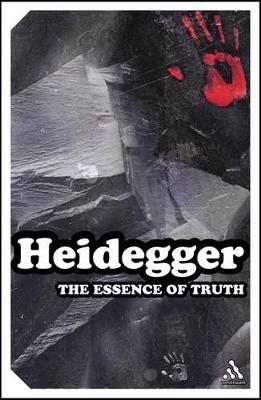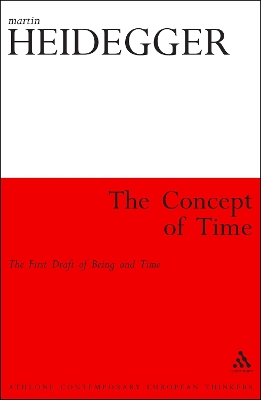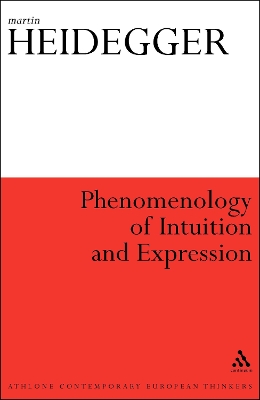Athlone Contemporary European Thinkers S.
6 total works
These Freiburg lectures from 1920 present Heidegger's phenomenological interpretation of human experience, with a focus on the problem of philosophical concept-formation and the the relation between philosophy and psychology.
The Essence of Human Freedom is a fundamental text for understanding HeideggerGCOs view of Greek philosophy and its relationship to modern philosophy. These previously untranslated lectures were delivered by Heidegger at the University of Freiburg in the summer of 1930.
This brand new translation of Martin Heidgger's Mindfulness (Besinnung) makes available in English for the first time Heidegger's second major being-historical treatise. Here Heidegger returns to and elaborates in detail many of the individual dimensions of the historically self-showing and transforming allotments of be-ing. In addition to the main text, this volume also includes two further important texts, A Retrospective Look at the Pathway (1937/8) and 'The Wish and the Will (On Preserving What is Attempted)' (1937/8), in which Heidegger surveys his unpublished works, gives instructions for their eventual publication, talks about his relationship to Catholic and Protestant Christianity, and reflects on his life's path. This is a major new translation of a key text from one of the most important thinkers of the twentieth century.
This volume is translated by Parvis Emad, Emeritus Professor of Philosophy at DePaul University, Chicago, and Thomas Kalary, Professor of Philosophy at Suvidya College, Bangalore.
This volume is translated by Parvis Emad, Emeritus Professor of Philosophy at DePaul University, Chicago, and Thomas Kalary, Professor of Philosophy at Suvidya College, Bangalore.
The Essence of Truth must count as one of Heidegger's most important works, for nowhere else does he give a comparably thorough explanation of what is arguably the most fundamental and abiding theme of his entire philosophy, namely the difference between truth as the unhiddenness of beings and truth as the correctness of propositions. For Heidegger, it is by neglecting the former primordial concept of truth in favor of the latter derivative concept that Western philosophy, beginning already with Plato, took off on its metaphysical course towards the bankruptcy of the present day. This first ever translation into English consists of a lecture course delivered by Heidegger at the University of Freiburg in 1931-32. Part One of the course provides a detailed analysis of Plato's allegory of the cave in the Republic, while Part Two gives a detailed exegesis and interpretation of a central section of Plato's Theaetetus, and is essential for the full understanding of his later well-known essay Plato's Doctrine of Truth.
As always with Heidegger's writings on the Greeks, the point of his interpretative method is to bring to light the original meaning of philosophical concepts, especially to free up these concepts to their intrinsic power.
As always with Heidegger's writings on the Greeks, the point of his interpretative method is to bring to light the original meaning of philosophical concepts, especially to free up these concepts to their intrinsic power.
The Concept of Time presents Heidegger's so-called Dilthey review, widely considered the first draft of his celebrated masterpiece, Being and Time. Here Heidegger reveals his deep commitment to Wilhelm Dilthey and Count Yorck von Wartenburg. He agrees with them that historicity must be at the centre of the new philosophy to come. However, he also argues for an ontological approach to history. From this ontological turn he develops the so-called categories of Dasein.
This work demonstrates Heidegger's indebtedness to Yorck and Dilthey and gives further evidence to the view that thought about history is the germ cell of Being and Time. However, it also shows that Heidegger's commitment to Dilthey was not without reservations and that his analysis of Dasein actually employs Husserl's phenomenology. The work reopens the question of history in a broader sense, as Heidegger struggles to thematize history without aligning it with world-historical events. The text also provides a concise and readable summary of the main themes of Being and Time and as such is an ideal companion to that text.
This work demonstrates Heidegger's indebtedness to Yorck and Dilthey and gives further evidence to the view that thought about history is the germ cell of Being and Time. However, it also shows that Heidegger's commitment to Dilthey was not without reservations and that his analysis of Dasein actually employs Husserl's phenomenology. The work reopens the question of history in a broader sense, as Heidegger struggles to thematize history without aligning it with world-historical events. The text also provides a concise and readable summary of the main themes of Being and Time and as such is an ideal companion to that text.
Phenomenology of Intuition and Expression is a crucial text for understanding the early development of Heidegger's thought. This lecture course was presented in the summer semester of 1920 at the University of Freiburg. At the center of this course is Heidegger's elaboration of the meaning and function of the phenomenological destruction. In no other work by Heidegger do we find as comprehensive a treatment of the theme of destruction as in this lecture course. Culminating in a destruction of contemporaneous philosophy in terms of its understanding of 'life' as a primal phenomenon, this lecture course can be seen to open the way towards a renewal of the meaning of philosophy as such.
This hugely important philosophical work is now available in English for the first time.
This hugely important philosophical work is now available in English for the first time.





